Discover nature's remedy for anxiety with these soothing herbal tea blends. Try the classic Chamomile and Lavender mix for deep relaxation, or opt for the zesty Lemon Balm Mint Fusion to calm your nerves. For potent relief, steep Passionflower with Valerian Root. Holy Basil and Ashwagandha work together as powerful adaptogens, while Skullcap and Linden Flower promote restful sleep. Experiment with Rose Petal and Oat Straw for a mood lift, or sip on Fennel and Licorice Root to ease digestion and tension. Don't forget Catnip and Hops for muscle relaxation. Each blend offers unique benefits to help you unwind and find peace. Explore these natural options to transform your wellness routine.
Chamomile and Lavender Blend
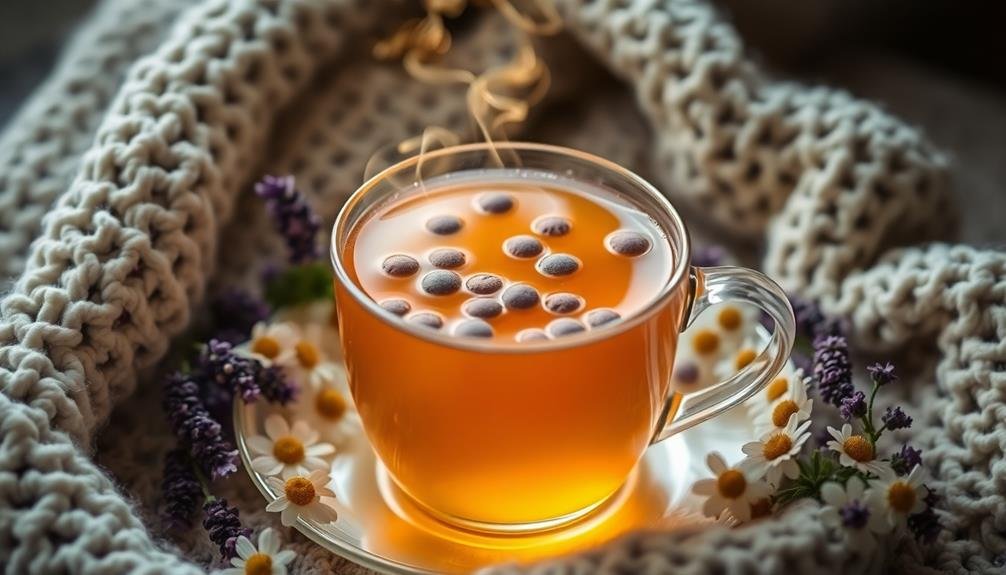
In light of its renowned calming properties, the chamomile and lavender blend stands out as a go-to option for relaxation. This soothing combination offers a powerful one-two punch against stress and anxiety.
Chamomile, with its mild, apple-like flavor, has been used for centuries to promote tranquility and improve sleep quality. It contains apigenin, an antioxidant that binds to specific receptors in your brain, potentially reducing anxiety and initiating sleep.
Lavender, on the other hand, brings its distinct floral aroma and taste to the blend. It's well-known for its ability to lower heart rate and blood pressure, creating a sense of calm. When combined, these two herbs work synergistically to ease tension and promote overall well-being.
To prepare this blend, you'll need equal parts dried chamomile flowers and lavender buds. Steep a tablespoon of the mixture in hot water for 5-7 minutes. You can add a touch of honey if desired.
For best results, enjoy this tea about an hour before bedtime to help unwind and prepare for a restful night's sleep. Regular consumption may lead to improved sleep patterns and reduced anxiety levels.
Lemon Balm Mint Fusion
You'll find a powerful stress-relieving combination in the lemon balm mint fusion.
This blend marries the calming properties of lemon balm with the soothing effects of mint, creating a potent relaxation aid.
The invigorating citrus undertones add a bright, uplifting note to this tranquil tea, making it perfect for unwinding after a long day.
Stress-Relieving Herb Combination
Frequently praised for its soothing properties, the Lemon Balm Mint Fusion blend offers a potent combination of stress-relieving herbs. This aromatic mixture combines the calming effects of lemon balm with the invigorating qualities of mint, creating a balanced and delightful tea experience.
Lemon balm, known for its ability to reduce anxiety and promote relaxation, contains compounds that interact with GABA receptors in your brain. These receptors help regulate mood and stress levels.
Mint, on the other hand, aids in digestion and provides a cooling sensation that can help ease tension headaches.
To prepare this blend, you'll need equal parts dried lemon balm and peppermint leaves. Steep one tablespoon of the mixture in hot water for 5-7 minutes. You can enhance the flavor by adding a touch of honey or a slice of lemon.
For best results, drink this tea in the evening to unwind after a stressful day. The combination of these herbs can help calm your mind, reduce muscle tension, and promote better sleep.
Refreshing Citrus Undertones
A zesty burst of citrus elevates the Lemon Balm Mint Fusion blend, adding a revitalizing dimension to its calming properties. This unique combination marries the soothing effects of lemon balm with the cool, invigorating notes of mint and the bright, uplifting essence of citrus. You'll find that this blend not only helps to ease anxiety but also invigorates your senses, providing a gentle energy boost without the jitters associated with caffeine.
The carefully balanced ingredients work in harmony to create a multi-faceted tea experience:
| Ingredient | Flavor Profile | Benefits |
|---|---|---|
| Lemon Balm | Mild, lemony | Reduces stress, improves sleep |
| Peppermint | Cool, crisp | Aids digestion, freshens breath |
| Lemongrass | Citrusy, sweet | Boosts immunity, reduces inflammation |
| Orange Peel | Tangy, bright | Rich in antioxidants, supports skin health |
| Lemon Verbena | Tart, fragrant | Eases muscle tension, enhances mood |
To prepare this invigorating blend, steep one teaspoon of the loose tea mixture in hot water for 5-7 minutes. You can enjoy it hot or iced, depending on your preference. For an extra burst of flavor, try adding a slice of fresh lemon or a sprig of mint to your cup.
Passionflower and Valerian Root Tea
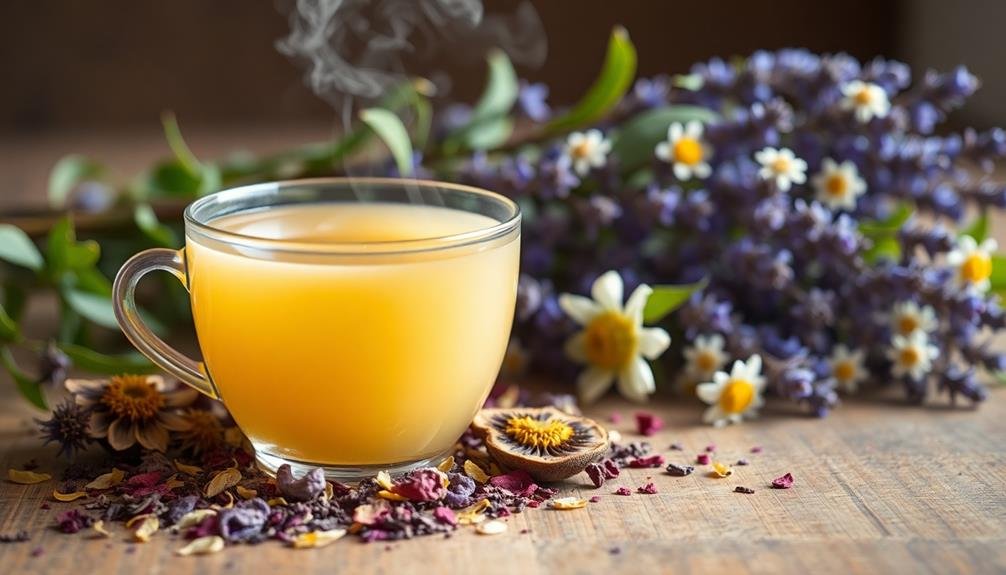
You'll find the combination of passionflower and valerian root to be a potent anxiety-reducing herbal blend.
To prepare this tea, steep 1 teaspoon each of dried passionflower and valerian root in hot water for 10-15 minutes, and drink it 30 minutes before bedtime.
While generally safe, be aware that this tea may cause drowsiness, dizziness, or interact with certain medications, so consult your healthcare provider before regular use.
Anxiety-Reducing Herbal Combination
Tranquility seekers often turn to the potent combination of passionflower and valerian root for natural anxiety relief. This powerful duo works synergistically to calm your nerves and promote relaxation.
Passionflower helps reduce racing thoughts and restlessness, while valerian root acts as a gentle sedative, easing tension and improving sleep quality.
To make the most of this anxiety-reducing herbal combination, follow these steps:
- Steep 1 teaspoon each of dried passionflower and valerian root in 8 ounces of hot water for 10 minutes.
- Strain the tea and add honey or lemon to taste, if desired.
- Drink 1-2 cups daily, preferably in the evening or before bedtime.
- Consult with a healthcare professional before regular use, especially if you're pregnant, nursing, or taking medications.
You'll likely notice the calming effects within 30 minutes of consumption. This blend can help you manage stress, reduce anxiety symptoms, and improve overall well-being.
However, it's important to remember that herbal remedies aren't a substitute for professional medical advice or treatment. If you're experiencing severe anxiety, it's essential to seek help from a qualified healthcare provider.
Preparation and Dosage
Preparing passionflower and valerian root tea correctly is key to maximizing its anxiety-reducing benefits. To make this calming blend, you'll need 1 teaspoon of dried passionflower and 1 teaspoon of dried valerian root per cup of water.
Bring water to a boil, then remove from heat and add the herbs. Cover and steep for 10-15 minutes. Strain the tea and sweeten if desired.
For best results, drink this tea 30-60 minutes before bedtime. It's best to start with one cup and assess how you feel. Some people may need to increase the dosage to two cups per day, but don't exceed this amount without consulting a healthcare professional.
Be aware that valerian root can cause drowsiness, so avoid driving or operating machinery after consumption.
It's also important to note that while this tea blend is generally safe for most adults, it may interact with certain medications. If you're pregnant, nursing, or taking any prescription drugs, consult your doctor before using this herbal remedy.
As with any new supplement, start slowly and monitor your body's response to verify it's right for you.
Potential Side Effects
While generally safe, passionflower and valerian root tea can cause some side effects in certain individuals. It's important to be aware of these potential reactions before incorporating these herbs into your routine. Some people may experience drowsiness, dizziness, or confusion, especially when consuming higher doses. If you're taking medications or have existing health conditions, consult your healthcare provider before using these teas.
Be mindful of the following potential side effects:
- Gastrointestinal discomfort: You might experience mild stomach upset, nausea, or diarrhea.
- Headaches: Some users report headaches after consuming passionflower or valerian root tea.
- Allergic reactions: Though rare, allergic responses can occur, including skin rashes or difficulty breathing.
- Interaction with medications: These herbs may interact with certain medications, including sedatives and blood thinners.
If you're pregnant, breastfeeding, or planning to undergo surgery, it's best to avoid these teas.
Always start with a lower dose to assess your tolerance. If you experience any unusual or severe symptoms, discontinue use and seek medical attention.
Holy Basil and Ashwagandha Infusion
Combining two powerful adaptogenic herbs, holy basil and ashwagandha create a potent infusion that can help you unwind and de-stress.
Holy basil, also known as tulsi, is revered in Ayurvedic medicine for its ability to promote mental clarity and reduce anxiety. It contains compounds that can lower cortisol levels, helping you feel more relaxed and balanced.
Ashwagandha, on the other hand, is prized for its ability to combat stress and fatigue. This herb has been shown to reduce symptoms of anxiety and improve overall well-being. When combined, these two herbs work synergistically to provide a calming effect on both your mind and body.
To prepare this infusion, steep 1 teaspoon each of dried holy basil and ashwagandha root in hot water for 10-15 minutes. You can add a touch of honey or lemon to enhance the flavor. Drink this tea once or twice daily for best results.
It's important to note that while this blend is generally safe, you should consult with a healthcare professional before adding it to your routine, especially if you're pregnant, nursing, or taking medications.
Regular consumption of this infusion can help you manage stress more effectively and promote a sense of calm throughout your day.
Skullcap and Linden Flower Mix
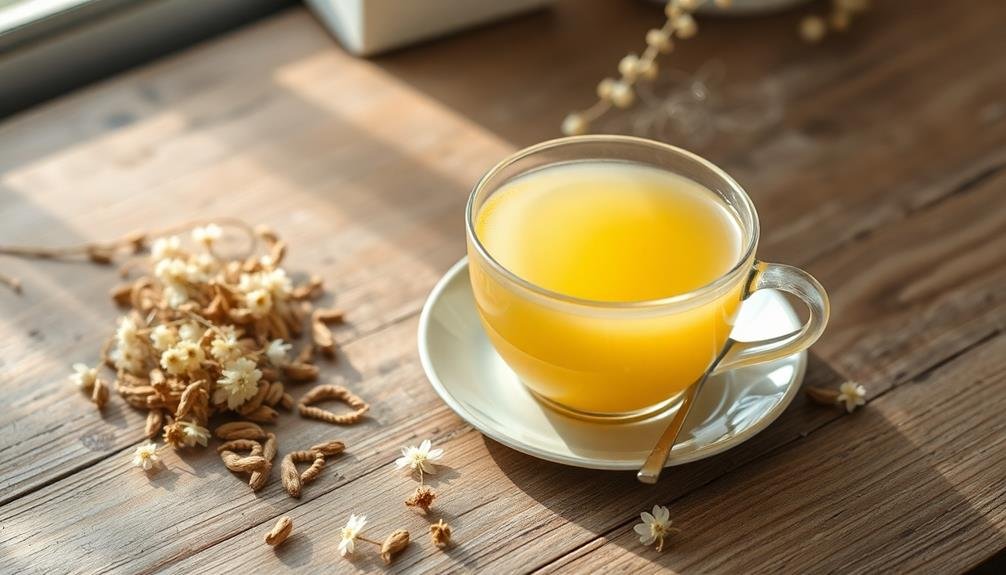
Another powerful herbal blend for relaxation combines skullcap and linden flower. This mix offers a potent combination of calming properties that can help ease anxiety and promote restful sleep.
Skullcap, known for its sedative effects, works synergistically with linden flower's mild relaxing qualities to create a soothing tea that's perfect for winding down after a stressful day.
To prepare this calming blend, you'll need:
- 1 teaspoon dried skullcap
- 1 teaspoon dried linden flowers
- 8 ounces of hot water
- Optional: honey or lemon to taste
Steep the herbs in hot water for 5-10 minutes, then strain and enjoy. You'll likely notice a subtle, earthy flavor with floral undertones.
Drink this tea 30-60 minutes before bedtime to experience its full benefits. Regular consumption may help reduce anxiety symptoms, improve sleep quality, and promote overall relaxation.
As with any herbal remedy, it's wise to consult your healthcare provider before incorporating this blend into your routine, especially if you're pregnant, nursing, or taking medications.
Rose Petal Oat Straw Combination
Rose petals and oat straw team up to create a delightfully soothing herbal tea blend. This combination offers a gentle, floral aroma with a hint of earthy sweetness that'll help you unwind after a long day.
Rose petals are known for their mood-lifting properties and ability to ease mild anxiety, while oat straw provides a wealth of nutrients that support your nervous system.
To prepare this calming concoction, you'll need equal parts dried rose petals and oat straw. Steep a tablespoon of the mixture in hot water for 5-7 minutes, then strain and enjoy. You can add a touch of honey if you prefer a sweeter taste.
This tea is especially beneficial when consumed in the evening, as it may help improve sleep quality.
The rose petal and oat straw combination is rich in antioxidants and minerals like calcium and magnesium. These nutrients work together to promote relaxation and reduce stress.
You'll find that regular consumption of this blend can help balance your mood and increase your overall sense of well-being. It's a natural, caffeine-free alternative that won't interfere with your sleep patterns, making it an excellent choice for those seeking a calming nighttime ritual.
Fennel and Licorice Root Brew
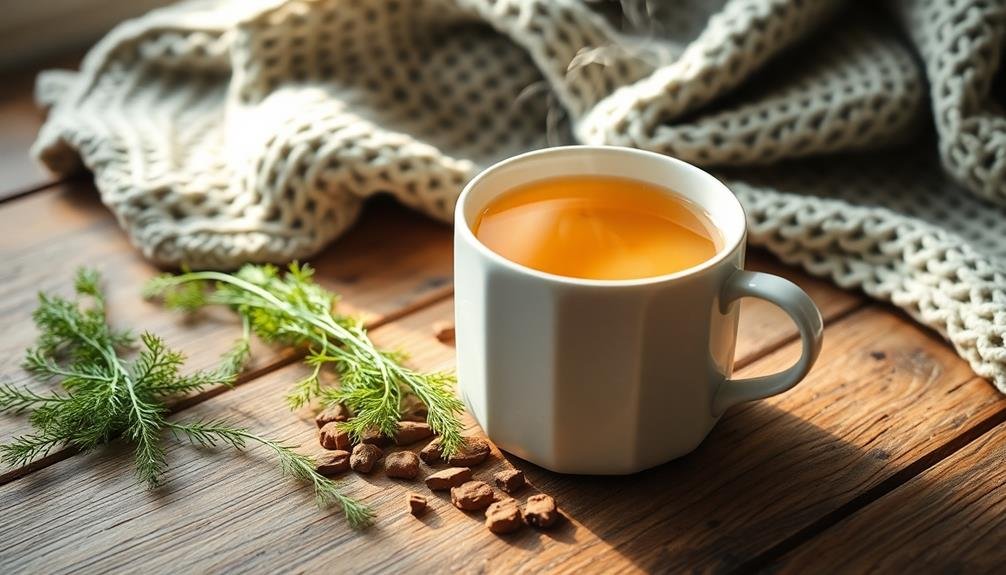
Fennel and licorice root create a potent herbal tea blend known for its soothing properties and distinctive flavor profile. This combination offers a sweet and aromatic infusion that can help calm your nerves and promote relaxation.
When brewing this tea, you'll notice its unique anise-like scent, which comes from the essential oils in both herbs.
To make the most of this calming brew, follow these steps:
- Use 1 teaspoon of dried fennel seeds and 1 teaspoon of chopped licorice root per cup of water
- Steep the herbs in hot water (not boiling) for 10-15 minutes
- Strain the tea and add honey if desired
- Sip slowly and mindfully, focusing on the flavors and aromas
This blend isn't just tasty; it's also packed with health benefits. Fennel can aid digestion and reduce bloating, while licorice root may help soothe sore throats and support adrenal function.
However, if you're pregnant, have high blood pressure, or are taking certain medications, consult your healthcare provider before consuming licorice root regularly. Enjoy this comforting tea in moderation as part of your relaxation routine.
Catnip and Hops Tea
You'll find catnip and hops tea to be a potent combination for relaxation.
This blend combines the gentle sedative effects of catnip with the sleep-promoting properties of hops.
To prepare, steep 1 teaspoon each of dried catnip and hops in hot water for 10 minutes, and enjoy up to 3 cups daily for ideal calming benefits.
Soothing Properties
A tranquil blend of catnip and hops creates a tea with powerful soothing properties. This combination offers a natural way to ease anxiety and promote relaxation. When you sip this calming concoction, you'll experience the gentle sedative effects of both herbs working in harmony.
Catnip, known for its ability to excite felines, has the opposite effect on humans. It contains nepetalactone, a compound that acts as a mild sedative. Hops, commonly used in beer production, also possesses calming qualities. Together, these herbs provide a synergistic effect that can help you unwind after a stressful day.
The soothing properties of catnip and hops tea offer several benefits:
- Reduces anxiety and nervousness
- Promotes better sleep quality
- Eases muscle tension and headaches
- Supports overall relaxation and well-being
You'll find this herbal blend particularly useful when you're feeling overwhelmed or having trouble sleeping. It's a caffeine-free alternative that won't interfere with your sleep cycle.
Preparation and Dosage
Now that you understand the soothing properties of catnip and hops tea, let's focus on how to prepare it properly. Start by using 1-2 teaspoons of dried catnip leaves and 1 teaspoon of dried hops flowers per cup of water.
Bring water to a boil, then remove it from heat and add the herbs. Let the mixture steep for 10-15 minutes, then strain and serve.
For ideal results, drink this tea 30-60 minutes before bedtime or during times of stress. It's safe to consume up to 3 cups daily, but don't exceed this amount as it may cause drowsiness or upset stomach.
If you're pregnant, nursing, or taking medications, consult your healthcare provider before using this blend.
To enhance the flavor, you can add a touch of honey or lemon. Store your dried herbs in airtight containers away from light and heat to maintain their potency.
For a stronger brew, increase steeping time, but be cautious as this may intensify the effects. Remember, herbal teas aren't regulated by the FDA, so it's vital to source your ingredients from reputable suppliers to guarantee quality and safety.
Kava Kava and St. John's Wort
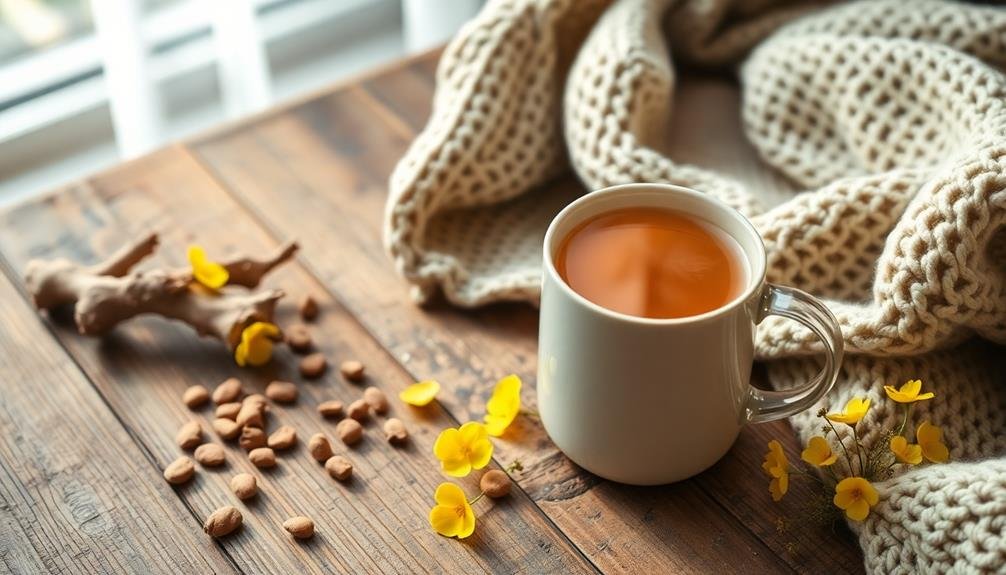
Delving into the domain of potent herbal remedies, we find Kava Kava and St. John's Wort. These two herbs have gained popularity for their calming effects, but it's essential to understand their proper use and potential risks.
Kava Kava, derived from the root of a South Pacific plant, is known for its anxiety-reducing properties. It can help you relax without impairing cognitive function. However, be aware that Kava may interact with certain medications and shouldn't be combined with alcohol.
St. John's Wort, a yellow-flowering plant, has been used for centuries to treat mild depression and anxiety. It's believed to work by increasing serotonin levels in the brain. But remember, it can interfere with various medications, including birth control pills and antidepressants.
When considering these herbs for your calming tea blend, keep these points in mind:
- Start with low doses and gradually increase if needed
- Consult your healthcare provider before use, especially if you're on medication
- Don't use during pregnancy or breastfeeding
- Discontinue use if you experience any adverse effects
While potent, these herbs require careful consideration and shouldn't be used as a substitute for professional medical advice or treatment.
Magnolia Bark and Ginger Blend
Moving from potent herbs to a gentler blend, let's explore the soothing combination of Magnolia Bark and Ginger. This duo offers a milder approach to calming anxiety while providing additional health benefits.
Magnolia bark, traditionally used in Chinese medicine, contains compounds that may help reduce stress and promote relaxation. It's known for its subtle, sweet aroma and slightly bitter taste.
Ginger, a well-known digestive aid, complements magnolia bark by adding a warm, spicy flavor and potentially enhancing the blend's anxiety-reducing effects. It may also help alleviate nausea and improve circulation, making this tea an excellent choice for those who experience physical symptoms of anxiety.
To prepare this blend, steep 1 teaspoon of dried magnolia bark and 1/2 teaspoon of grated fresh ginger in hot water for 10 minutes. You can adjust the ratio to suit your taste preferences. For a sweeter drink, add a touch of honey.
Enjoy this tea in the evening to unwind after a stressful day or before bed to promote restful sleep. Remember, while this blend is generally safe, it's always best to consult your healthcare provider before incorporating new herbal remedies into your routine.
Frequently Asked Questions
Can Pregnant Women Safely Consume Anxiety-Reducing Herbal Teas?
You should be cautious with herbal teas during pregnancy. Some can be safe, but others may pose risks. It's best to consult your doctor before consuming any anxiety-reducing herbal teas while pregnant. Always prioritize your baby's safety.
How Long Does It Take for Herbal Teas to Show Calming Effects?
You'll typically feel calming effects from herbal teas within 15-30 minutes after drinking. However, it's important to remember that individual responses vary. Consistent daily consumption over several weeks may lead to more noticeable long-term benefits.
Are There Any Potential Side Effects of Drinking Anxiety-Reducing Herbal Teas Regularly?
You might experience mild side effects from regular anxiety-reducing herbal teas, such as stomach upset, headaches, or drowsiness. Some herbs can interact with medications or cause allergic reactions. It's best to consult your doctor before frequent use.
Can These Herbal Teas Be Combined With Prescription Anxiety Medications?
You shouldn't combine herbal teas with prescription anxiety medications without consulting your doctor. There's a risk of interactions that could affect your treatment's efficacy or cause side effects. Always inform your healthcare provider about any supplements you're taking.
What's the Recommended Daily Intake for Anxiety-Reducing Herbal Teas?
You'll want to limit your intake of anxiety-reducing herbal teas to 2-3 cups daily. It's best to start with one cup and gradually increase. Always listen to your body and consult a healthcare professional for personalized advice.
In Summary
You've now discovered ten soothing herbal tea blends to help calm your nerves and ease anxiety. Remember, while these natural remedies can be beneficial, they're not a substitute for professional medical advice. It's always best to consult your healthcare provider before incorporating new herbs into your routine. Experiment with these blends to find what works best for you, and enjoy the relaxing ritual of brewing and sipping your calming cup of tea.

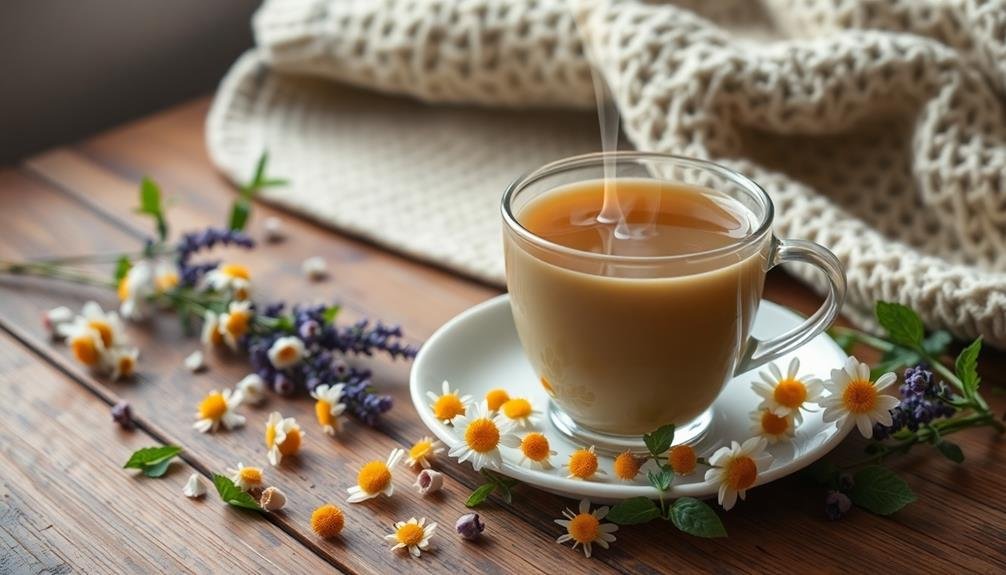



Leave a Reply